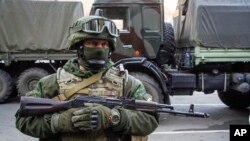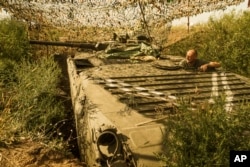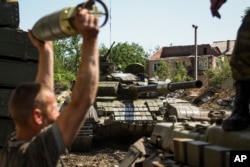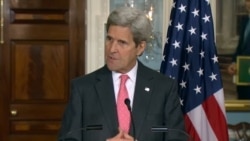Western and Russian diplomats are meeting this week to discuss ways to defuse the conflicts in eastern Ukraine, where fighting continues between Russia-backed separatists and government forces despite attempts for a truce. While top U.S. officials are touting the importance of a full implementation of the Minsk agreement, critics say that the peace deal is a way to legitimize ugly facts on the ground.
The foreign ministers of France, Germany, Ukraine and Russia are scheduled to meet Thursday in Paris. They hope to achieve a durable and effective cease-fire in eastern Ukraine to prepare the ground for a political settlement.
Mediated by Germany and France, the so-called Minsk II agreement is a package of measures to alleviate the ongoing conflicts, including a cease-fire, between Moscow-backed rebels and government forces in eastern Ukraine. It was agreed to by Ukraine, Russia and separatists in February of 2015.
While terms of the complex Minsk II were not fully carried out by its deadline of Dec. 31, 2015, top U.S. officials say it remains the best hope for peace, weapons withdrawal, decentralization in eastern Ukraine, and the return of Ukrainian state sovereignty over its border.
Criticism of peace accord
But critics said the western-brokered peace agreement cannot alter the fact that Crimea was annexed by Russia illegally two years ago. It has not changed Moscow's behavior.
"You see in Ukraine where the insertion of Russian forces, insertion of supplies to Ukraine rebels, Russian nationals in Ukraine, was able to create a state within a state, and then a political process that basically institutionalized the division of Ukraine, so the Minsk process really is, in my view, a way to legitimize the facts on the ground," former U.S. Deputy Assistant Secretary of State Adam Ereli told VOA in an interview.
Ukraine foreign policy analyst Ian Brzezinski said that while Moscow is the one that violates Ukraine's territory integrity, the Minsk agreement treats Kyiv as equally wrong.
Brzezinski, who works for the Atlantic Council, a Washington-based think tank, criticized the "incrementalist approach" by the U.S. to respond to Russia assertiveness and aggression.
"I think the mistake has been the administration feels that it's been prudent in following a course of incrementalism, incremental economic sanctions, incremental political isolation, incremental military actions," he said.
Brzezinski added that stronger economic sanctions, a more robust military response to shore up NATO allies, as well as more security assistance — including lethal weapons to Ukraine — are needed to deter Russian aggression in central and eastern Europe.
Criticism of Russia
A senior U.S. State Department official blamed Russia and the separatists for not following through on commitments under the Minsk agreement.
He told VOA a full cease-fire and weapons withdrawal is needed for the implementation of political, economic and humanitarian aspects of Minsk, including the voting in local elections. That is a big sticking point for the Minsk process to move forward.
Violations of the cease-fire have thrown into doubt plans under the Minsk agreement for local elections in separatist-held areas.
"If elections are to take place," said German Foreign Minister Frank-Walter Steinmeier, "we need an electoral law, then we need a security condition on the ground that allows for elections to take place."
Secretary of State John Kerry attended a new conference with Steinmeier earlier this week in Washington.
"It's very important for Russia to live up to its obligations and to make sure the separatists do, and it's also very important for the Kyiv government to undertake its steps," Kerry said.
The Kyiv government has postponed a law on elections in the pro-Russian separatist east. Steinmeier said it is one of the impediments preventing the Minsk process from moving forward.
Germany and France also urged the Ukraine government to stamp out corruption.
In conversations with Russian president Vladimir Putin, President Barack Obama has discussed the importance of full implementation of the Minsk agreements and the responsibility to protect the integrity and sovereignty of Ukraine, according to Kerry.
WATCH: Two sides of the Minsk agreement















